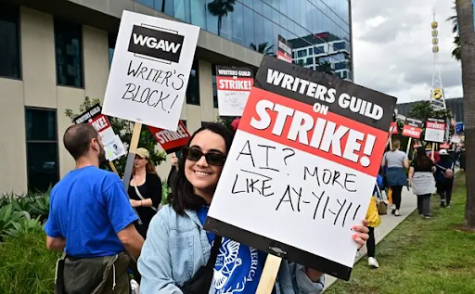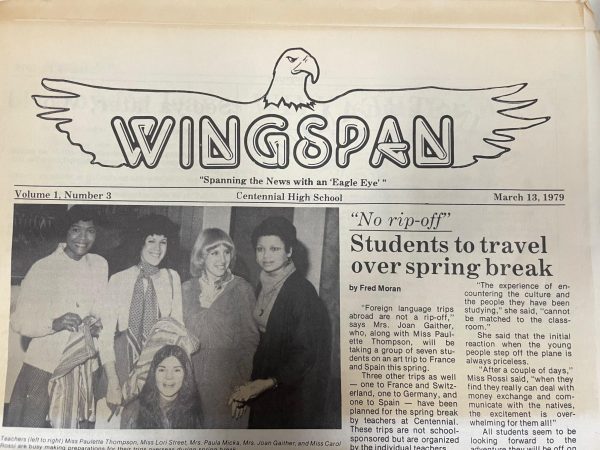Will Hollywood ever be the same? What the WGA strike means for the film industry
Since the early 1900s, Hollywood has been a pillar of American culture, taking on the role of representing American stories and lifestyles behind a smokescreen of glitz and glamor. For decades, the American people have settled on their couches amongst family and friends to consume the next sitcom, romcom, or documentary. There has never been a shortage of stories to tell. Until the storytellers refused to tell them.
While the figureheads of Hollywood have always been the actors and actresses plastered across People magazine covers and red carpets, the real magicians of the American entertainment industry have been the writers. We’ve laughed at their wit, sobbed at their audacity, but have failed to give them anything in return. “Without writing you can’t act or direct well. It starts there,” Centennial English teacher Corey O’Brien remarks.
As of Tuesday, May 2, members of the Writers Guild of America (WGA) have refused to pick up a pen in protest of unfair compensation, unfulfilled staffing requirements, the potential use of AI in the writers room, and the general disrespect for their jobs within the industry. Talk shows such as The Tonight Show, The Daily Show and Jimmy Kimmel Live have all announced that they will be showing reruns for the rest of the week. As of right now, 98% of Writers Guild members are in support of the protest and have joined the picket lines in Los Angeles and New York City. This strike will not only have a massive impact on Hollywood’s pocketbook, but has the potential to change the American entertainment industry forever.
Streaming TV
The 2000s kicked off America’s golden age of television and slowly evolved into the overwhelming era of “Peak TV.” Our current age of constant content on multitudes of platforms. While streaming services have been beneficial to the consumer, these same services have upended the way Hollywood functions.
For one, streaming services call for shorter seasons, which have been generally appreciated by the American consumer but pitch the writer into a universe of unknown. With shorter seasons, middle class writers are left bouncing from job to job with no promise of a stable salary. “I love an eight-episode TV show, but I didn’t realize that it’s actually costing people jobs,” O’Brien comments. While big name writers might benefit from this new age of constant content with short seasons, Variety magazine reports that it is becoming harder for rookie writers to climb the ladder. Streaming services also take the longest time to film, which leaves writers unable to search for other job opportunities.
The New York Times reports that streaming services have messed with the usual calendar for film and TV production, with TV shows usually premiering before Labor Day and finales airing in the spring. While streaming services make entertainment that much more accessible for consumers, they are a constant source of uncertainty for writers who are trying to make a living.
The Writers Room
Along with streaming services, another element of the “Peak TV” era has been the upending of the traditional writers room. The increasingly popular use and abuse of “mini rooms” is one of the WGA’s main concerns. Mini rooms are groups of writers that are gathered to write episodes prior to the filming of a TV episode and are paid at fixed rates. While this might seem like a good idea in theory, mini rooms can occupy a writer for eight to ten weeks or more, and they are not allowed to pursue other job inquiries while in a mini room. There is also no promise of production or broadcast. While writers rooms usually try to maintain a 9-5 schedule, writers can be tied up in a mini room for an indefinite amount of time, while being paid at a fixed rate. Some writers go as far to say that participating in mini rooms are like gigs. The pay is fixed and sure, but often not adequate compensation for the amount of work that the writers are doing. Most writers agree that if writer rooms were compensated adequately, it could be an effective method for post and pre-production work, but with the minimal pay, all it’s doing is making it harder for writers to financially support themselves. O’Brien comments on the importance of effective communication between writers, “When you limit that [collaboration] obviously it’s going to be problematic, that collaboration gets stifled, that creativity gets stifled.”
The WGA states that mini rooms should be treated and compensated the same as traditional writers rooms, and encourage WGA members to advocate for themselves when negotiating a mini room contract.
AI in the Writers Room

Another concern on the frontlines of WGA’s strike is the potential use of AI within the writers room. AI has already made major strides with the creation of programs like Chat GPT, and writers worry where AI’s place is within the film industry. As of right now writers aren’t worried about AI taking over their jobs. As Vox magazine reports, the current stories it produces are not nearly compelling enough to create a television show. However, it’s more of a question of credibility and pay. If writers gain ideas through AI programs, who deserves the payment? Questions of this nature lead writers and the purpose of their jobs down a slippery slope that they are already trying desperately to avoid. As of right now, the WGA’s contract, or their Minimum Basic Agreement, states that a writer is defined as a human being. Through the current strike, the WGA is asking Hollywood to refrain from using AI to write source material or allowing studios to produce writer-less movies.
What Does This Mean?
The strike’s impact is currently being felt all over Hollywood. CNN reports that the filming of hit Netflix show Stranger Things has been paused in solidarity of the strike. Celebrities like writer Quinta Brunson and actress Amanda Seyfried showed their support for the WGA strike on the Met Gala carpet earlier this month and actress and talk show host Drew Barrymore stepped down from hosting the MTV Movie & TV Awards in solidarity.
The WGA has promised to stay on strike for as long as it takes for production companies to change their contracts. The last WGA strike in 2007 lasted about 100 days and cost San Francisco about 2.1 billion dollars. The Alliance of Motion Picture and Television Producers ask Hollywood “to reach a deal that is mutually beneficial to writers and the health and longevity of the industry.” New York Times reports.
rc/jy/ac/ew



